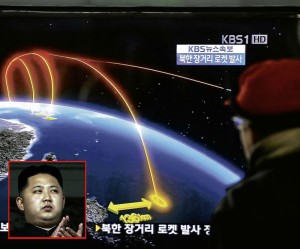
PYRRHIC VICTORY A man in Seoul, South Korea, watches a TV broadcast of North Korea’s successful rocket launch on Wednesday. The surprise launch was roundly condemned by most of the free world, including the Philippines. The suddenness of the launch ends all hope that the new North Korean leader Kim Jong-un might be a young progressive reformer. AFP/AP
UNITED NATIONS—The UN Security Council on Wednesday held emergency talks on North Korea’s long-range rocket launch amid western demands for tough action against the isolated state.
Widespread condemnation followed North Korea’s firing of a rocket, which it says successfully took a satellite into space. The act came just days before the North’s young ruler, Kim Jong-Un, marks 12 months in power.
The 15-member Security Council held closed consultations on the new proliferation challenge, with western nations looking for signs of China’s willingness to punish its neighbor.
After a failed attempt to launch a rocket in April, the Security Council said it could take “action” if there was a new bid. Western envoys said the council must back up its words.
The council “should react quickly and should react strongly to this provocation,” Britain’s UN envoy Mark Lyall Grant told reporters ahead of the meeting.
Germany’s UN ambassador Peter Wittig said the council had to “make good” on the April warning.
Diplomats said the Security Council could decide a statement condemning the launch on Wednesday and then negotiate a formal resolution.
Most attention will be focused on China, the North’s main ally and provider of aid. The council passed sanctions after the North’s nuclear tests in 2006 and 2009 but China has indicated it is reluctant to allow more.
“Exactly what the Chinese would be prepared to accept both in form and substance is not yet clear,” said one senior western diplomat ahead of the talks.
North Korea insisted the mission was not a banned inter-continental missile test but carried a scientific satellite into space.
“The satellite has entered the orbit as planned,” Pyongyang’s Korean Central News Agency (KCNA) said in a statement repeated later in a triumphant special state television broadcast.
The state agency released pictures showing a white rocket taking off with clouds of smoke billowing into the snowy landscape.
The first and second stages fell in the sea off the Korean Peninsula, while the third splashed down east of the Philippines.
The United States and its allies were infuriated. China expressed “regret” at the successful launch by its wayward communist ally, while calling on all sides to avoid “stoking the flames.”
The launch was a “clear violation” of a 2009 UN Security Council resolution which bans North Korea from using ballistic missile technology, according to UN leader Ban Ki-moon and the North’s western critics.
US National Security Council spokesman Tommy Vietor highlighted the “threat” to security in East Asia and said “the United States will strengthen and increase our close coordination with allies and partners.”
“North Korea is only further isolating itself by engaging in such provocative acts,” Vietor added in a statement.
“France will support firm action by the Security Council and is working in this direction,” said a French foreign ministry spokesman in Paris.
Masao Okonogi, a professor of Korean politics at Keio University in Japan, said the launch would thrust North Korea close to the top of the national security agenda for President Barack Obama.
“Putting a satellite into orbit means that you have technology to get a warhead to a targeted area. Now, North Korea is becoming not only a threat to the neighboring countries but also a real threat to the United States,” he said.
China responded relatively quickly by expressing “regret” and pressing the country to abide by UN resolutions.
But in a commentary, state news agency Xinhua also decried “bellicose rhetoric and gestures” by all concerned, and defended North Korea’s right to explore space.
Russia labeled Pyongyang’s defiance of UN resolutions “unacceptable” and warned the launch would have a “negative effect” on regional stability, while the European Union threatened new sanctions.
Defying the international uproar, the North vowed more launches.
“No matter what others say, we will continue to exercise our legitimate right to launch satellites,” said a foreign ministry spokesman, urging the international community to stay calm “to prevent the situation from developing (an) undesirable direction”.
The country’s leader Kim Jong-Un, who is in his late 20s, was believed to be keen that the launch fall close to the first anniversary of the death of his father and former leader Kim Jong-Il on December 17.
A previous launch of the same Unha-3 rocket in April ended in embarrassing failure, with the carrier exploding shortly after take-off.